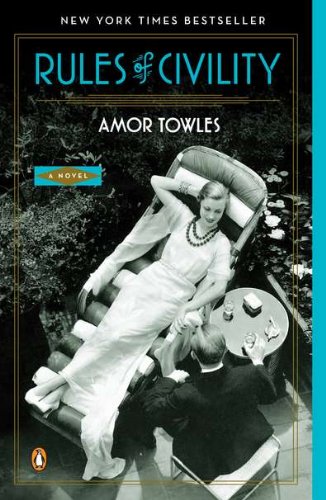 “It is a lovely oddity of human nature,” observes our heroine, Katey Kontent, “that a person is more inclined to interrupt two people in conversation than one person alone with a book, even if it is a foolish romance.” Commuting readers of Amor Towles’s debut novel, Rules of Civility, will certainly find themselves grateful for this lovely oddity as they immerse themselves in Katey’s world.
“It is a lovely oddity of human nature,” observes our heroine, Katey Kontent, “that a person is more inclined to interrupt two people in conversation than one person alone with a book, even if it is a foolish romance.” Commuting readers of Amor Towles’s debut novel, Rules of Civility, will certainly find themselves grateful for this lovely oddity as they immerse themselves in Katey’s world.
The story, which concerns the good and not-so-good decisions made by Katey and her friends over the course of a single year (1938), is told from the perspective of her older self. Her memory is stirred by “Many Are Called”, an exhibition of photos Walker Evans surreptitiously took of regular Americans on the subway during the 1930s. In it, she sees two photos of a man she had known briefly very well, Tinker Grey, but had fallen out of touch with. The photos take her right back to the last day of 1937, when she and her friend Eve Ross first set eyes on Tinker…
 The Rules of Civility are the hundred and ten precepts a young George Washington jotted down in a writing exercise as a schoolboy in Virginia (see the full list here). Early on in Towles’s novel, Katey finds a book of Washingtoniana in Tinker’s possession and, in his annotated copy of the Rules thinks she’s found the key to his immaculate manners. As with any set of such precepts, of course, there’s following the letter and there’s following the spirit; the course of Katey’s 1938 will unearth the tension between these two states.
The Rules of Civility are the hundred and ten precepts a young George Washington jotted down in a writing exercise as a schoolboy in Virginia (see the full list here). Early on in Towles’s novel, Katey finds a book of Washingtoniana in Tinker’s possession and, in his annotated copy of the Rules thinks she’s found the key to his immaculate manners. As with any set of such precepts, of course, there’s following the letter and there’s following the spirit; the course of Katey’s 1938 will unearth the tension between these two states.
A car accident throws a spanner into the delicately balanced ménage à trois developing between Tinker, Katey and Eve. The strains and deceptions that ensue, and a series of chance encounters — the type, one senses, that only Manhattan allows — set Katey off on an excursion into the riotous world of the wealthy and unscrupulous.
In Rules of Civility, Towles has crafted a marvellous pastiche of the popular writing of the 1930s, from character names — Bitsy Houghton, Hank Grey, Mason Tate, Dickey Vanderwhile — to the kind of fast-talking wit one associates with screwball comedy:
Cancel my meeting with the mayor on Tuesday. Tell him I’ve been called to Alaska. Get me all the front covers of Vogue, Vanity Fair and Time for the last two years. If you can’t find them downstairs, take a pair of scissors to the public library. My sister’s birthday is August first. Get her something timid from Bendel’s. She says she’s a five; assume she’s a six.
Not just his dialogue; his prose style throughout has a movie-like vividness. Towles’s 1938 is a souped-up, hyper-stylised version of the late Depression, a world in which the very wealthy still led Gatsbyesque lives and the poor got by in flophouses and dorms. Much like Wes Anderson’s splendid The Grand Budapest Hotel, Rules of Civility is doubly nostalgic, a frame (1938) within a frame (1966). Every detail is lovingly polished, and naturalistic or not, it’s irresistible. In Towles’s world, 1938 was a time when a young lady of means could pop into the Chase Manhattan Bank without identification and emerge ten minutes later with a new sweater and an envelope full of cash announcing, “They’ll do anything for me at Chase.” In another casually tossed off vignette, Eve gets stuck in an elevator:
She had enjoyed herself immensely. Aside from the elevator boy, who did top-notch impressions of Hollywood gangsters and carried a flask of Irish whiskey on his hip, the only other passenger on the ill-fated descent had been Lady Ramsay, the white-haired wife of a peer who, when pressed, could also do a few Hollywood impressions of her own.
Even one-line characters like this elevator boy and Lady Ramsay have the immediacy of a New Yorker cartoon.
In her writing on what she calls the “nostalgic memory film”, Pam Cook suggests that such films are used to reconstruct “an idealised past as a site of pleasurable contemplation and yearning”. Rules of Civility is the novelistic counterpart of this phenomenon. The success and the pleasure of recent nostalgic memory works such as Mad Men, American Hustle and The Artist derive from their ability to recreate a milieu in which, even in their complications, things are perceived to be simpler, more stylish, more elegantly resolved, more deliciously bittersweet. Towles recalls a time (to me, glorious) when it was still possible to reel off Parkerish one-liners like “Slurring is the cursive of speech” without self-consciousness. His aphoristic style, recalling arch-wits like Coward and Fitzgerald, is similarly pleasurable: “That’s how quickly New York City comes about — like a weather vane — or the head of a cobra. Time tells which.”
As the novel draws to a close, the older Katey reflects on the Empire State Building, “a view that practically conjugated hope: I have hoped; I am hoping; I will hope.” If you want to at once relive your first Manhattan romance and reignite your love for this glorious chaos, you could do little better than to sink yourself into the deep warm bubble bath of Amor Towles’s Rules of Civility.
Amor Towles will appear at the next Seriously Entertaining event, “In Case of Emergency”, on April 28. Tickets are on sale here.




